2021-2022学年人教版英语中考复习之九年级 Units 5、6课件(共67张PPT)
文档属性
| 名称 | 2021-2022学年人教版英语中考复习之九年级 Units 5、6课件(共67张PPT) | 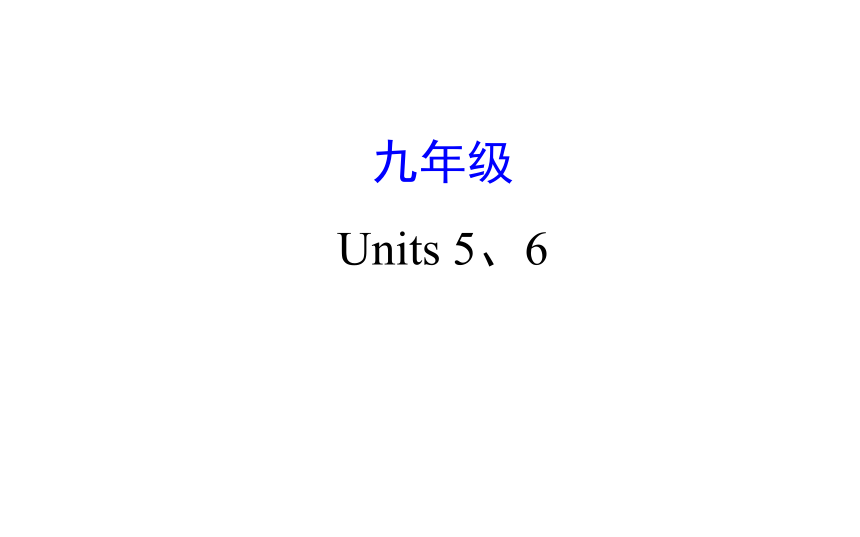 | |
| 格式 | ppt | ||
| 文件大小 | 1.1MB | ||
| 资源类型 | 教案 | ||
| 版本资源 | 人教新目标(Go for it)版 | ||
| 科目 | 英语 | ||
| 更新时间 | 2021-07-28 16:20:37 | ||
图片预览

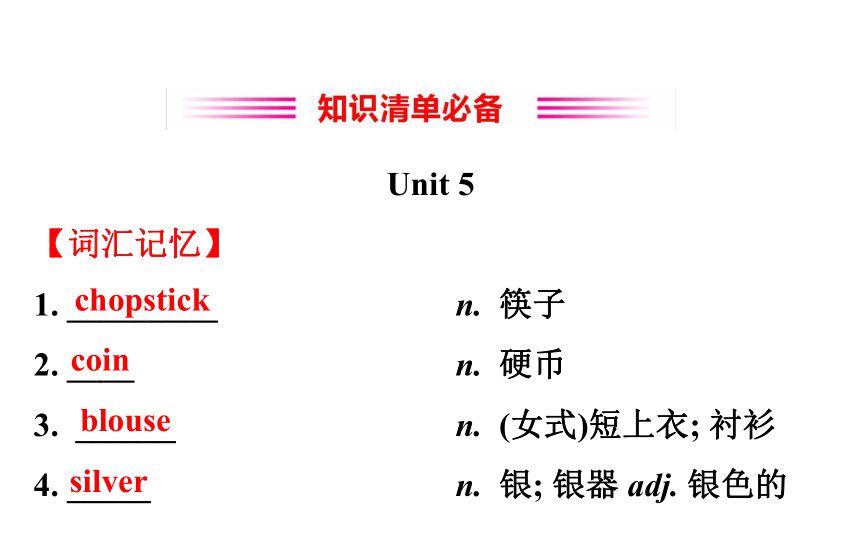
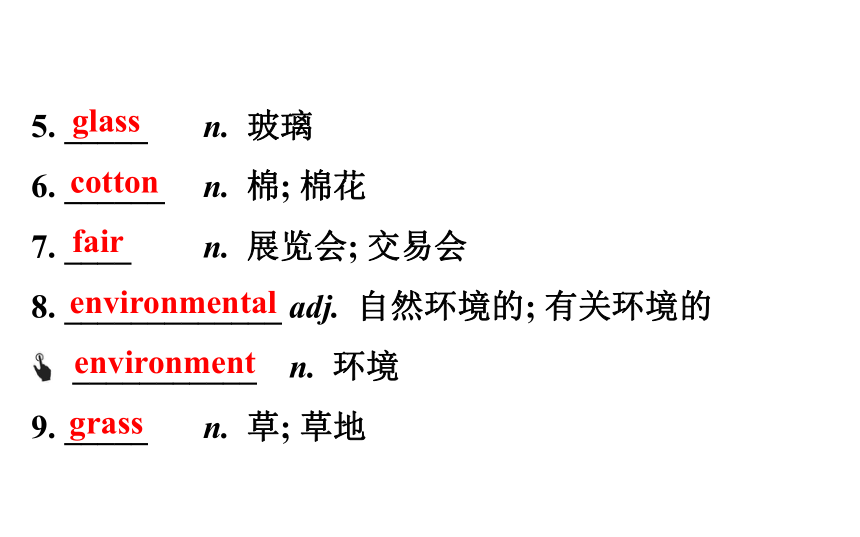
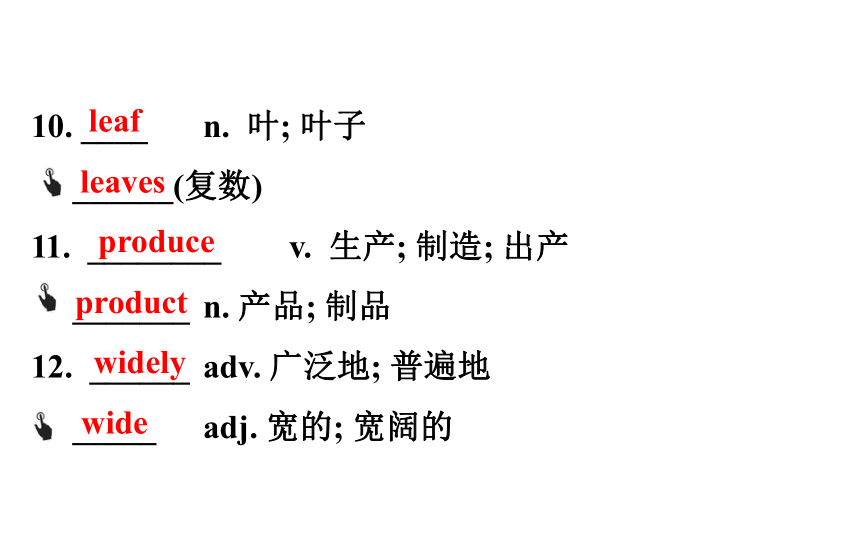
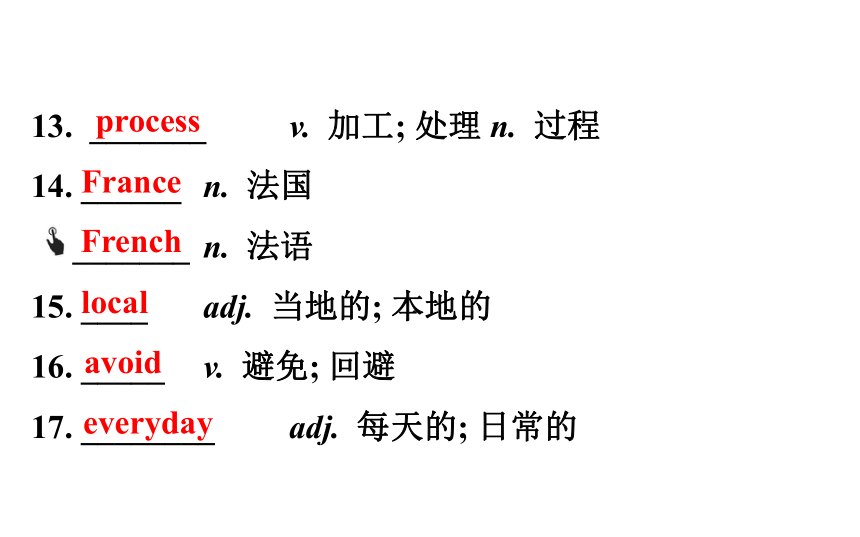
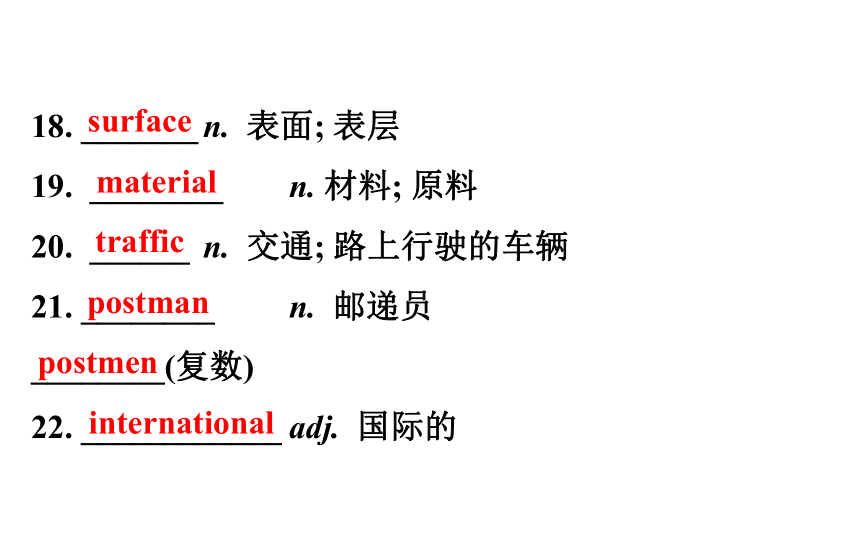
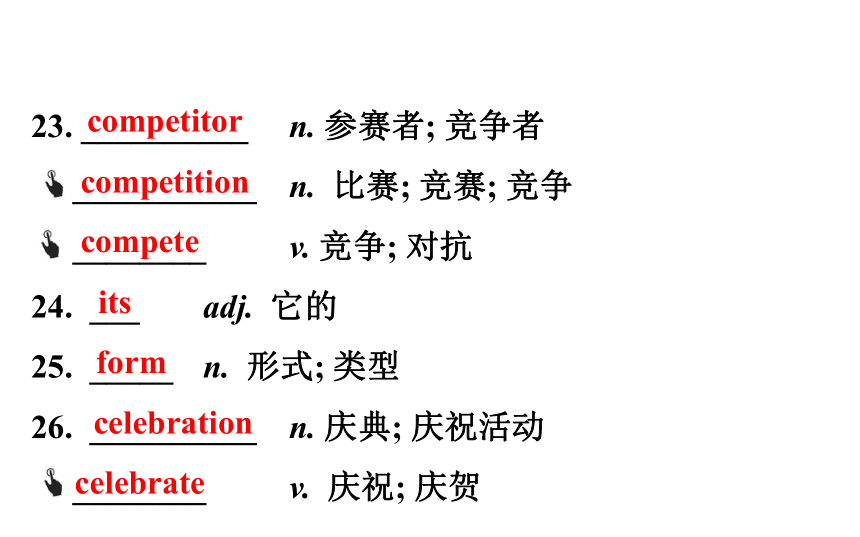
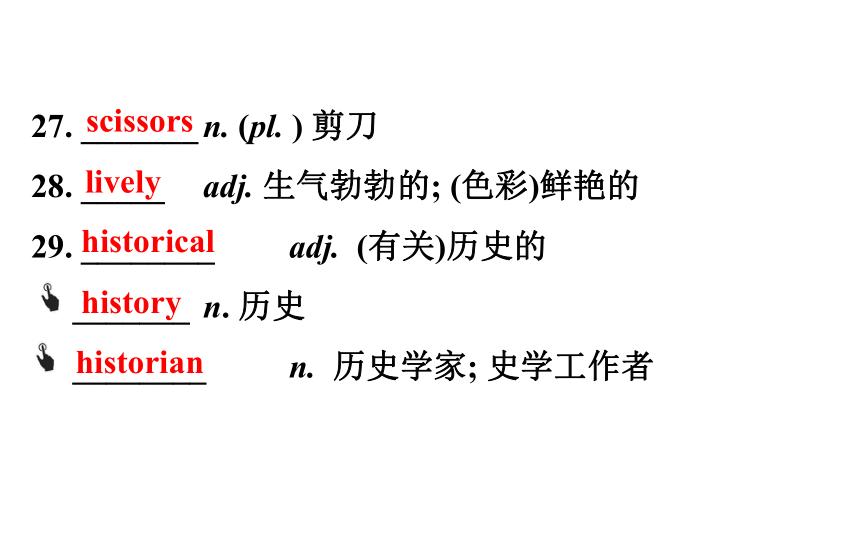
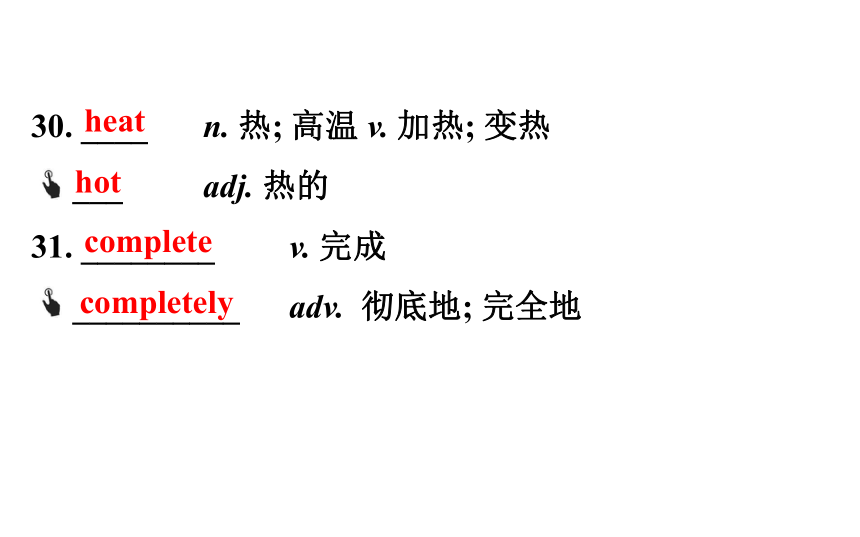
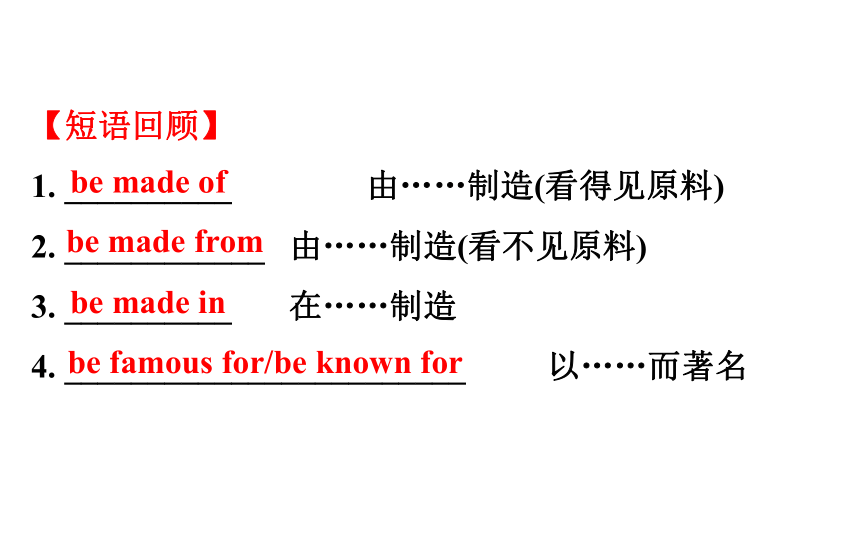
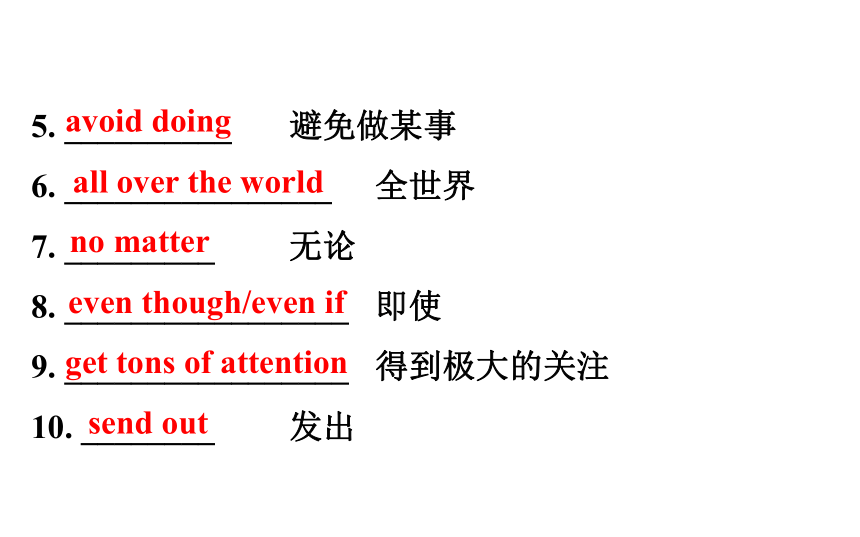
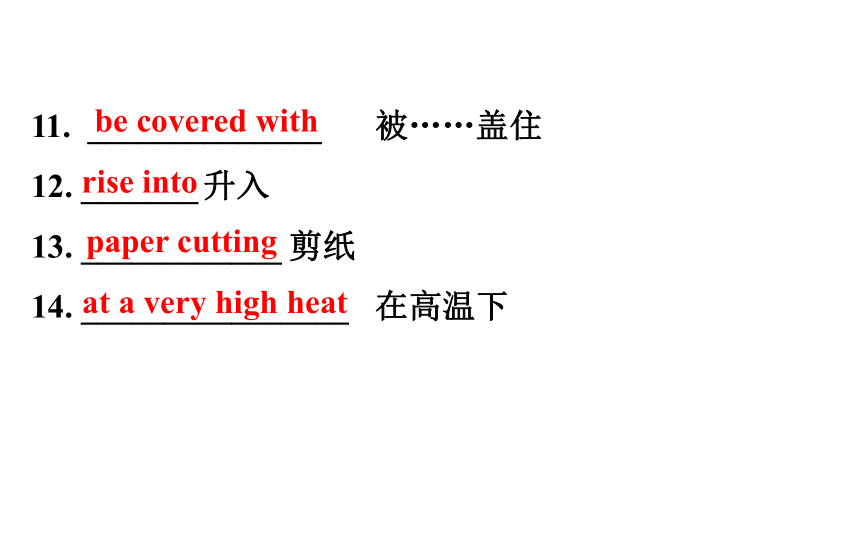
文档简介
九年级
Units 5、6
Unit 5
【词汇记忆】
1. _________ n. 筷子
2. ____ n. 硬币
3. ______ n. (女式)短上衣; 衬衫 ?
4. _____ n. 银; 银器 adj. 银色的
chopstick
coin
blouse
silver
5. _____ n. 玻璃
6. ______ n. 棉; 棉花
7. ____? n. 展览会; 交易会
8. _____________ adj. 自然环境的; 有关环境的
___________ n. 环境
9. _____ n. 草; 草地
glass
cotton
fair
environmental
environment
grass
10. ____ n. 叶; 叶子
______(复数)
11. ________ v. 生产; 制造; 出产 ?
_______ n. 产品; 制品
12. ______? adv. 广泛地; 普遍地 ?
_____ adj. 宽的; 宽阔的
leaf
leaves
produce
product
widely
wide
13. _______ v. 加工; 处理 n. 过程 ?
14. ______ n. 法国
_______ n. 法语
15. ____ adj. 当地的; 本地的
16. _____? v. 避免; 回避
17. ________ adj. 每天的; 日常的
process
France
French
local
avoid
everyday
18. _______ n. 表面; 表层
19. ________ n. 材料; 原料?
20. ______ n. 交通; 路上行驶的车辆 ?
21. ________ n. 邮递员
________(复数)
22. ____________ adj. 国际的
surface
material
traffic
postman
postmen
international
23. __________ n. 参赛者; 竞争者
___________ n. 比赛; 竞赛; 竞争
________ v. 竞争; 对抗
24. ___ adj. 它的 ?
25. _____? n. 形式; 类型 ?
26. __________? n. 庆典; 庆祝活动 ?
________? v. 庆祝; 庆贺
competitor
competition
compete
its
form
celebration
celebrate
27. _______ n. (pl. ) 剪刀
28. _____ adj. 生气勃勃的; (色彩)鲜艳的
29. ________ adj. (有关)历史的
_______ n. 历史
________ n. 历史学家; 史学工作者
scissors
lively
historical
history
historian
30. ____ n. 热; 高温 v. 加热; 变热
___ adj. 热的
31. ________ v. 完成
__________ adv. 彻底地; 完全地
heat
hot
complete
completely
【短语回顾】
1. __________ 由……制造(看得见原料)?
2. ____________ 由……制造(看不见原料)?
3. __________ 在……制造?
4. ________________________? 以……而著名 ?
be made of
be made from
be made in
be famous for/be known for
5. __________ 避免做某事 ?
6. ________________ 全世界 ?
7. _________ 无论 ?
8. _________________ 即使 ?
9. _________________ 得到极大的关注?
10. ________ 发出 ?
avoid doing
all over the world
no matter
even though/even if
get tons of attention
send out
11. ______________ 被……盖住 ?
12. _______ 升入 ?
13. ____________ 剪纸?
14. ________________ 在高温下?
be covered with
rise into
paper cutting
at a very high heat
【句式填写】
1. 中国哪里产茶?
____________________________? ?
2. 无论你买什么, 你可能会认为那些产品都是由那些国
家制造的。
______________you may buy, you might think those
products ____________those countries. ?
Where is tea produced in China
No matter what
were made in
3. 好像世界上有很多人都喝中国茶。
___________many people all over the world drink Chinese tea. ?
It seems that
4. ——茶叶是怎么生产的?
—__________________? ?
——当(茶)叶长好了的时候, 它们就被手工采摘, 然后送
去加工。
—When the leaves are ready, they ____________hand
and then __________processing. ?
How is tea produced
are picked by
are sent for
5. 它们被看作是幸福和美好祝福的光明的象征。
They __________bright symbols of happiness and good
wishes. ?
are seen as
Unit 6
【词汇记忆】
1. ____ n. 样式; 款式
2. _______ n. 项目; 工程 ?
3. ________ n. 高兴; 愉快
_______ adj. 对……感到高兴的
________ adj. 令人愉快的
style
project
pleasure
pleased
pleasant
4. _____ adj. 每日的; 日常的?
5. ___ v. 列表; 列清单 n. 名单; 清单?
6. ________ v. 提到; 说到
7. _________ adj. 意外的; 偶然的 ?
________ n. (交通)事故; 意外遭遇
8. _____ n. 统治者; 支配者 n. 尺子
____ v. 统治
daily
list
mention
accidental
accident
ruler
rule
9. ____ v. 煮沸; 烧开
______? adj. 煮沸的; 煮熟的
______ adj. 沸腾的
10. _______ v. 保持不变; 剩余
11. _____ n. 气味v. 发出……气味; 闻到
____________(过去式) ?
____________(过去分词)
boil
boiled
boiling
remain
smell
smelled/smelt
smelled/smelt
12. ________ adj. 国家的; 民族的
______? n. 国家; 民族
13. _____n. 贸易; 交易v. 做买卖; 从事贸易 ?
______? n. 商人
14. __________ n. 受欢迎; 普及
_______ adj. 受欢迎的; 普遍的
national
nation
trade
trader
popularity
popular
15. ______? n. 疑惑; 疑问 v. 怀疑?
16. ____? adj. 低的; 矮的
17. _________? pron. 某人; n. 重要人物
18. ____? v. 锁上; 锁住n. 锁
19. ____? v. (使)发出钟声或铃声; 打电话?
_________(过去式 /过去分词)
doubt
low
somebody
lock
ring
rang/rung
20. __________? n. 地震
21. _______ adj. 突然(的)
________? adv. 突然(地)
22. _______ adj. 音乐的; 有音乐天赋的
______? n. 音乐
________ n. 音乐家
earthquake
sudden
suddenly
musical
music
musician
23. __________ n. 器械; 仪器; 工具?
24. _____ adj. 咸的
____ n. 食盐
25. ________ n. 顾客; 客户?
26. _________? adj. 加拿大的; 加拿大人的
n. 加拿大人
_______ n. 加拿大
instrument
salty
salt
customer
Canadian
Canada
27. ______ v. 分开; 分散
28. ______? n. 篮; 筐
29. ____? n. 英雄; 男主角
______(复数)
30. ___________ adj. 职业的; 专业的
_________ n. 职业
divide
basket
hero
heroes
professional
profession
【短语回顾】
1. __________ 被用作……?
2. ____________ 乐意(帮忙) ?
3. ___________ 有道理?
4. __________ 偶然; 意外地 ?
5. _________ 发生; 出现?
6. _____________ 毫无疑问; 的确?
be used for
with pleasure
have a point
by accident
take place
without doubt
7. _____________ 突然; 猛地?
8. _____________ 破坏规则?
9. __________ 错误地?
10. _______________ 把……分开
11. _________ 钦佩; 仰慕?
12. __________________ 实现某人的梦想 ?
all of a sudden
break the rule
by mistake
divide. . . into. . .
look up to
achieve one’s dream
【句式填写】
1. 我认为电视是在汽车之前被发明的。
I think the TV ____________before the car. ?
2. 拉链是什么时候被发明的?
_________the zipper ________? ?
was invented
When was
invented
3. ——它们被用来作什么?
—____________________? ?
——它们被用来在黑暗中看东西。
—They ________________in the dark. ?
What are they used for
are used for seeing
4. 据说有一位叫作神农的中国统治者最早发现了茶可
以饮用。
____________a Chinese ruler _____Shen Nong was the
first to discover tea as a drink. ?
It is said that
called
5. 人们认为, 茶在六至七世纪传到了朝鲜和日本。
_______________tea ___________to Korea and Japan
during the 6th and 7th centuries. ?
6. ——它是谁发明的?
—______________________?
——它是惠特科姆·贾德森发明的。
—It ______________Whitcomb Judson. ?
It is believed that
was brought
Who was it invented by?
was invented by
7. 同时, 他们需要阻止竞争队把球投进他们自己的篮
筐。
At the same time, they ___________the competing team
___________the ball into their own basket. ?
need to stop
from getting
1. No matter what you may buy, you might think those products were made in those countries. ?
不管你买什么, 你可能会认为那些产品是那些国家制造的。(Unit 5, P35)
?no matter 不论; 无论
【测考点】
( ) (1)_________ well you drive, you must drive
carefully. ?
A. No matter where B. In order that
C. No matter how D. As soon as
C
(2) (2018·滨州中考) No matter how hard your situation
is, you had better not give up. (英译汉)
__________________________________
(3)无论你说什么, 我都不会相信你。
______________you may say, I won’t believe in you. ?
(4)不论你选择哪一个, 你都会满意的。
_______________you choose, you will be satisfied. ?
不论你的处境有多难, 你最好别放弃。
No matter what
No matter which
【巧归纳】
no matter作“无论; 不管”用, 用以引导让步状语从句, 常用在no matter what (who/when. . . )中, 分别表示“无论何事”“无论何人”“无论何时”等。
No matter what you do, you should do it well.
不管做什么事, 你都应该把它做好。
No matter who you are (=Whoever you are), I’ll never let you in.
无论你是谁, 我绝不让你进去。
2. He realized that Americans can hardly avoid buying products made in China.
他意识到美国人几乎无法避免购买中国制造的产品。(Unit 5, P35)
? avoid v. 避免; 回避
【测考点】
(1) (2018·苏州中考) When talking to British people, we
should _____(避免) subjects like age, weight or money.
avoid
( )(2)(2019·安顺中考)—What time do you get up
in the morning on school days?
—I get up at 7: 00 every morning to avoid _________the
early bus. .?
A. miss B. missed
C. missing D. to miss
C
( )(3)You must be more careful and _________
the same mistakes you’ve ever made. ?
A. plan B. follow
C. avoid D. enjoy
C
( )(4)—Why did he go to work so early ?
—In order to _________the heavy traffic in the city. ?
A. avoid B. stop
C. cancel D. solve
A
【巧归纳】avoid用作及物动词, 意为“避免; 回避”, 后跟名词、代词或动词的-ing形式作宾语, 但是不能跟不定式。
We will have to set off early to avoid the heavy traffic tomorrow morning. 明天上午我们不得不早点出发以避免拥挤的交通。
Sometimes you may hardly avoid buying something you never use.
有时候你避免不了买你永远用不到的东西。
Only then did I realize she was avoiding me.
直到那时我才意识到她在回避我。
【拓展】后常跟v. -ing的动词
3. When the lanterns are lit, they slowly rise into the air like small hot-air balloons for all to see. ?
当灯笼被点燃时, 它们会慢慢升到空中, 就像大家看到的小热气球。 (Unit 5, P38)
?light (lit, lit) v. 点燃 n. 光 ; rise v. (rose, risen)&n. 升起; 增加; 提高
【测考点】
(1)写出句中黑体部分的含义。
①A fire is comparable with the sun; both give light
and heat. ___
②The light in this room is poor. _____
③Light colors suit you best. _____
光
光线
浅的
④I bought a light suitcase. I can take it very easily.
_____
⑤The match lights easily. _____
⑥The light went out, and the room was plunged into
darkness. ___
轻的
点燃
灯
(2)用动词raise/rise翻译句子。
①他举起了右手。
______________________?
②烟雾腾起升入空中。
_____________________.?
He raised his right hand.
Smoke rose into the sky.
【辨不同】
rise
不及物动词
常指自然地“上升、上涨、起立、起床”等
raise
及物动词
常指人为地“增加、上涨、升高”等
【巧归纳】light可用作动词, 意为“点燃, 点亮”, 其过去式和过去分词为lit或lighted。
【拓展】light的不同词性和含义如下:
4. It produced a nice smell so he tasted the brown water.
它发出了好闻的味道, 所以他品尝了这棕色的水。(Unit 6, P43)
?smell n. 气味 v. 发出……气味; 闻到
【测考点】
( )(1)(2019·乐山中考)—Look, Linda. The flowers
in our classroom came out in one night.
—I can’t believe it. They are beautiful and colorful.
They _________great. ?
A. sound B. smell C. taste
B
( )(2)Mom is making dinner. It_________ so nice!
.?
A. smells B. tastes C. feels D. sounds
( )(3)(2017·青海中考)—Tony, can you guess what
I am cooking?
—It _________like mutton. ?
A. smells B. looks C. tastes
A
A
【巧归纳】 smell的三种词性
5. Basketball has not only become a popular sport to play, but it has also become a popular sport to watch. ?
篮球不但成为受欢迎的活动项目, 而且也成为一项观赏性运动。(Unit 6, P46)
? not only. . . but also. . . 不但……而且……
【测考点】
( )(1)(2018·黄冈中考)—Which show do you
prefer, Running Man or The Reader? .
—The Reader, of course. _________ I _________my
brother likes it. ?
A. Both; and B. Neither; nor
C. Either; or D. Not only; but also
D
( )(2)(2017·咸宁中考)—What have you learnt
after three years’ study in China, Maria?
—I was taught _________knowledge _________good
manners. ?
A. either; or B. not only; but also
C. neither; nor D. not; but
B
( )(3)(2019·广元中考) Not only you but also I
_________interested in the cartoon called Peppa Pig. ?
A. am B. is C. are
(4)不但我而且我父母也喜欢你。
____ ____ _ ___ ____my parents like you.
A
Not
only
I
but
also
【巧归纳】
(1)not only. . . but also. . . 意为“不但……而且……”, 用作并列连词, 可用来连接并列主语、谓语、宾语、表语、状语、定语以及句子等。
(2)连接并列主语时遵循“就近原则”。
(3)当连接句子, 且not only置于句首时, not only后面的句子需要部分倒装, 但but also 后面句子不倒装。
(4)有时but与also可以分开, also也可以被省略。
Not only I but also Mary is interested in English.
不但我而且玛丽也对英语感兴趣。
Not only does he like watching basketball, but he (also) likes playing basketball.
他不但喜欢看篮球比赛, 而且还喜欢打篮球。
语法点 一般现在时和一般过去时的被动语态
→见语法精讲强化篇P201
考点1: 一般现在时的被动语态的结构: 助动词be(am, is, are)+及物动词的过去分词。
考点2: 一般过去时的被动语态的结构: 助动词be(was/were)+及物动词的过去分词。
【即时冲关】
Ⅰ. 用括号中动词的适当形式填空
1. Tea __________(produce) in many places all over
China. ?
2. Apples _________(pick) by hand every autumn. ?
3. These plants ___________(grow) by my father last
year. ?
is produced
are picked
were grown
4. The bridge over the river ___________(finish) three
years ago. ?
5. Students _____________(not allow) to come into
school before seven o’clock in the morning. ?
was finished
aren’t allowed
Ⅱ. 将下列句子改为被动语态
1. I often see him play football after school.
He __often ____ __play football after school.
2. My grandma cleans the room every day.
The room __ _______by my grandma every day.
3. They made those cars in Guangzhou.
Those cars _____ _____in Guangzhou.
is
seen
to
is
cleaned
were
made
4. His grandmother keeps many ducks on the farm.
Many ducks ___ ____by his grandmother on the farm.
5. A middle school student invented a new robot.
A new robot ____ ________by a middle school student.
are
kept
was
invented
Units 5、6
Unit 5
【词汇记忆】
1. _________ n. 筷子
2. ____ n. 硬币
3. ______ n. (女式)短上衣; 衬衫 ?
4. _____ n. 银; 银器 adj. 银色的
chopstick
coin
blouse
silver
5. _____ n. 玻璃
6. ______ n. 棉; 棉花
7. ____? n. 展览会; 交易会
8. _____________ adj. 自然环境的; 有关环境的
___________ n. 环境
9. _____ n. 草; 草地
glass
cotton
fair
environmental
environment
grass
10. ____ n. 叶; 叶子
______(复数)
11. ________ v. 生产; 制造; 出产 ?
_______ n. 产品; 制品
12. ______? adv. 广泛地; 普遍地 ?
_____ adj. 宽的; 宽阔的
leaf
leaves
produce
product
widely
wide
13. _______ v. 加工; 处理 n. 过程 ?
14. ______ n. 法国
_______ n. 法语
15. ____ adj. 当地的; 本地的
16. _____? v. 避免; 回避
17. ________ adj. 每天的; 日常的
process
France
French
local
avoid
everyday
18. _______ n. 表面; 表层
19. ________ n. 材料; 原料?
20. ______ n. 交通; 路上行驶的车辆 ?
21. ________ n. 邮递员
________(复数)
22. ____________ adj. 国际的
surface
material
traffic
postman
postmen
international
23. __________ n. 参赛者; 竞争者
___________ n. 比赛; 竞赛; 竞争
________ v. 竞争; 对抗
24. ___ adj. 它的 ?
25. _____? n. 形式; 类型 ?
26. __________? n. 庆典; 庆祝活动 ?
________? v. 庆祝; 庆贺
competitor
competition
compete
its
form
celebration
celebrate
27. _______ n. (pl. ) 剪刀
28. _____ adj. 生气勃勃的; (色彩)鲜艳的
29. ________ adj. (有关)历史的
_______ n. 历史
________ n. 历史学家; 史学工作者
scissors
lively
historical
history
historian
30. ____ n. 热; 高温 v. 加热; 变热
___ adj. 热的
31. ________ v. 完成
__________ adv. 彻底地; 完全地
heat
hot
complete
completely
【短语回顾】
1. __________ 由……制造(看得见原料)?
2. ____________ 由……制造(看不见原料)?
3. __________ 在……制造?
4. ________________________? 以……而著名 ?
be made of
be made from
be made in
be famous for/be known for
5. __________ 避免做某事 ?
6. ________________ 全世界 ?
7. _________ 无论 ?
8. _________________ 即使 ?
9. _________________ 得到极大的关注?
10. ________ 发出 ?
avoid doing
all over the world
no matter
even though/even if
get tons of attention
send out
11. ______________ 被……盖住 ?
12. _______ 升入 ?
13. ____________ 剪纸?
14. ________________ 在高温下?
be covered with
rise into
paper cutting
at a very high heat
【句式填写】
1. 中国哪里产茶?
____________________________? ?
2. 无论你买什么, 你可能会认为那些产品都是由那些国
家制造的。
______________you may buy, you might think those
products ____________those countries. ?
Where is tea produced in China
No matter what
were made in
3. 好像世界上有很多人都喝中国茶。
___________many people all over the world drink Chinese tea. ?
It seems that
4. ——茶叶是怎么生产的?
—__________________? ?
——当(茶)叶长好了的时候, 它们就被手工采摘, 然后送
去加工。
—When the leaves are ready, they ____________hand
and then __________processing. ?
How is tea produced
are picked by
are sent for
5. 它们被看作是幸福和美好祝福的光明的象征。
They __________bright symbols of happiness and good
wishes. ?
are seen as
Unit 6
【词汇记忆】
1. ____ n. 样式; 款式
2. _______ n. 项目; 工程 ?
3. ________ n. 高兴; 愉快
_______ adj. 对……感到高兴的
________ adj. 令人愉快的
style
project
pleasure
pleased
pleasant
4. _____ adj. 每日的; 日常的?
5. ___ v. 列表; 列清单 n. 名单; 清单?
6. ________ v. 提到; 说到
7. _________ adj. 意外的; 偶然的 ?
________ n. (交通)事故; 意外遭遇
8. _____ n. 统治者; 支配者 n. 尺子
____ v. 统治
daily
list
mention
accidental
accident
ruler
rule
9. ____ v. 煮沸; 烧开
______? adj. 煮沸的; 煮熟的
______ adj. 沸腾的
10. _______ v. 保持不变; 剩余
11. _____ n. 气味v. 发出……气味; 闻到
____________(过去式) ?
____________(过去分词)
boil
boiled
boiling
remain
smell
smelled/smelt
smelled/smelt
12. ________ adj. 国家的; 民族的
______? n. 国家; 民族
13. _____n. 贸易; 交易v. 做买卖; 从事贸易 ?
______? n. 商人
14. __________ n. 受欢迎; 普及
_______ adj. 受欢迎的; 普遍的
national
nation
trade
trader
popularity
popular
15. ______? n. 疑惑; 疑问 v. 怀疑?
16. ____? adj. 低的; 矮的
17. _________? pron. 某人; n. 重要人物
18. ____? v. 锁上; 锁住n. 锁
19. ____? v. (使)发出钟声或铃声; 打电话?
_________(过去式 /过去分词)
doubt
low
somebody
lock
ring
rang/rung
20. __________? n. 地震
21. _______ adj. 突然(的)
________? adv. 突然(地)
22. _______ adj. 音乐的; 有音乐天赋的
______? n. 音乐
________ n. 音乐家
earthquake
sudden
suddenly
musical
music
musician
23. __________ n. 器械; 仪器; 工具?
24. _____ adj. 咸的
____ n. 食盐
25. ________ n. 顾客; 客户?
26. _________? adj. 加拿大的; 加拿大人的
n. 加拿大人
_______ n. 加拿大
instrument
salty
salt
customer
Canadian
Canada
27. ______ v. 分开; 分散
28. ______? n. 篮; 筐
29. ____? n. 英雄; 男主角
______(复数)
30. ___________ adj. 职业的; 专业的
_________ n. 职业
divide
basket
hero
heroes
professional
profession
【短语回顾】
1. __________ 被用作……?
2. ____________ 乐意(帮忙) ?
3. ___________ 有道理?
4. __________ 偶然; 意外地 ?
5. _________ 发生; 出现?
6. _____________ 毫无疑问; 的确?
be used for
with pleasure
have a point
by accident
take place
without doubt
7. _____________ 突然; 猛地?
8. _____________ 破坏规则?
9. __________ 错误地?
10. _______________ 把……分开
11. _________ 钦佩; 仰慕?
12. __________________ 实现某人的梦想 ?
all of a sudden
break the rule
by mistake
divide. . . into. . .
look up to
achieve one’s dream
【句式填写】
1. 我认为电视是在汽车之前被发明的。
I think the TV ____________before the car. ?
2. 拉链是什么时候被发明的?
_________the zipper ________? ?
was invented
When was
invented
3. ——它们被用来作什么?
—____________________? ?
——它们被用来在黑暗中看东西。
—They ________________in the dark. ?
What are they used for
are used for seeing
4. 据说有一位叫作神农的中国统治者最早发现了茶可
以饮用。
____________a Chinese ruler _____Shen Nong was the
first to discover tea as a drink. ?
It is said that
called
5. 人们认为, 茶在六至七世纪传到了朝鲜和日本。
_______________tea ___________to Korea and Japan
during the 6th and 7th centuries. ?
6. ——它是谁发明的?
—______________________?
——它是惠特科姆·贾德森发明的。
—It ______________Whitcomb Judson. ?
It is believed that
was brought
Who was it invented by?
was invented by
7. 同时, 他们需要阻止竞争队把球投进他们自己的篮
筐。
At the same time, they ___________the competing team
___________the ball into their own basket. ?
need to stop
from getting
1. No matter what you may buy, you might think those products were made in those countries. ?
不管你买什么, 你可能会认为那些产品是那些国家制造的。(Unit 5, P35)
?no matter 不论; 无论
【测考点】
( ) (1)_________ well you drive, you must drive
carefully. ?
A. No matter where B. In order that
C. No matter how D. As soon as
C
(2) (2018·滨州中考) No matter how hard your situation
is, you had better not give up. (英译汉)
__________________________________
(3)无论你说什么, 我都不会相信你。
______________you may say, I won’t believe in you. ?
(4)不论你选择哪一个, 你都会满意的。
_______________you choose, you will be satisfied. ?
不论你的处境有多难, 你最好别放弃。
No matter what
No matter which
【巧归纳】
no matter作“无论; 不管”用, 用以引导让步状语从句, 常用在no matter what (who/when. . . )中, 分别表示“无论何事”“无论何人”“无论何时”等。
No matter what you do, you should do it well.
不管做什么事, 你都应该把它做好。
No matter who you are (=Whoever you are), I’ll never let you in.
无论你是谁, 我绝不让你进去。
2. He realized that Americans can hardly avoid buying products made in China.
他意识到美国人几乎无法避免购买中国制造的产品。(Unit 5, P35)
? avoid v. 避免; 回避
【测考点】
(1) (2018·苏州中考) When talking to British people, we
should _____(避免) subjects like age, weight or money.
avoid
( )(2)(2019·安顺中考)—What time do you get up
in the morning on school days?
—I get up at 7: 00 every morning to avoid _________the
early bus. .?
A. miss B. missed
C. missing D. to miss
C
( )(3)You must be more careful and _________
the same mistakes you’ve ever made. ?
A. plan B. follow
C. avoid D. enjoy
C
( )(4)—Why did he go to work so early ?
—In order to _________the heavy traffic in the city. ?
A. avoid B. stop
C. cancel D. solve
A
【巧归纳】avoid用作及物动词, 意为“避免; 回避”, 后跟名词、代词或动词的-ing形式作宾语, 但是不能跟不定式。
We will have to set off early to avoid the heavy traffic tomorrow morning. 明天上午我们不得不早点出发以避免拥挤的交通。
Sometimes you may hardly avoid buying something you never use.
有时候你避免不了买你永远用不到的东西。
Only then did I realize she was avoiding me.
直到那时我才意识到她在回避我。
【拓展】后常跟v. -ing的动词
3. When the lanterns are lit, they slowly rise into the air like small hot-air balloons for all to see. ?
当灯笼被点燃时, 它们会慢慢升到空中, 就像大家看到的小热气球。 (Unit 5, P38)
?light (lit, lit) v. 点燃 n. 光 ; rise v. (rose, risen)&n. 升起; 增加; 提高
【测考点】
(1)写出句中黑体部分的含义。
①A fire is comparable with the sun; both give light
and heat. ___
②The light in this room is poor. _____
③Light colors suit you best. _____
光
光线
浅的
④I bought a light suitcase. I can take it very easily.
_____
⑤The match lights easily. _____
⑥The light went out, and the room was plunged into
darkness. ___
轻的
点燃
灯
(2)用动词raise/rise翻译句子。
①他举起了右手。
______________________?
②烟雾腾起升入空中。
_____________________.?
He raised his right hand.
Smoke rose into the sky.
【辨不同】
rise
不及物动词
常指自然地“上升、上涨、起立、起床”等
raise
及物动词
常指人为地“增加、上涨、升高”等
【巧归纳】light可用作动词, 意为“点燃, 点亮”, 其过去式和过去分词为lit或lighted。
【拓展】light的不同词性和含义如下:
4. It produced a nice smell so he tasted the brown water.
它发出了好闻的味道, 所以他品尝了这棕色的水。(Unit 6, P43)
?smell n. 气味 v. 发出……气味; 闻到
【测考点】
( )(1)(2019·乐山中考)—Look, Linda. The flowers
in our classroom came out in one night.
—I can’t believe it. They are beautiful and colorful.
They _________great. ?
A. sound B. smell C. taste
B
( )(2)Mom is making dinner. It_________ so nice!
.?
A. smells B. tastes C. feels D. sounds
( )(3)(2017·青海中考)—Tony, can you guess what
I am cooking?
—It _________like mutton. ?
A. smells B. looks C. tastes
A
A
【巧归纳】 smell的三种词性
5. Basketball has not only become a popular sport to play, but it has also become a popular sport to watch. ?
篮球不但成为受欢迎的活动项目, 而且也成为一项观赏性运动。(Unit 6, P46)
? not only. . . but also. . . 不但……而且……
【测考点】
( )(1)(2018·黄冈中考)—Which show do you
prefer, Running Man or The Reader? .
—The Reader, of course. _________ I _________my
brother likes it. ?
A. Both; and B. Neither; nor
C. Either; or D. Not only; but also
D
( )(2)(2017·咸宁中考)—What have you learnt
after three years’ study in China, Maria?
—I was taught _________knowledge _________good
manners. ?
A. either; or B. not only; but also
C. neither; nor D. not; but
B
( )(3)(2019·广元中考) Not only you but also I
_________interested in the cartoon called Peppa Pig. ?
A. am B. is C. are
(4)不但我而且我父母也喜欢你。
____ ____ _ ___ ____my parents like you.
A
Not
only
I
but
also
【巧归纳】
(1)not only. . . but also. . . 意为“不但……而且……”, 用作并列连词, 可用来连接并列主语、谓语、宾语、表语、状语、定语以及句子等。
(2)连接并列主语时遵循“就近原则”。
(3)当连接句子, 且not only置于句首时, not only后面的句子需要部分倒装, 但but also 后面句子不倒装。
(4)有时but与also可以分开, also也可以被省略。
Not only I but also Mary is interested in English.
不但我而且玛丽也对英语感兴趣。
Not only does he like watching basketball, but he (also) likes playing basketball.
他不但喜欢看篮球比赛, 而且还喜欢打篮球。
语法点 一般现在时和一般过去时的被动语态
→见语法精讲强化篇P201
考点1: 一般现在时的被动语态的结构: 助动词be(am, is, are)+及物动词的过去分词。
考点2: 一般过去时的被动语态的结构: 助动词be(was/were)+及物动词的过去分词。
【即时冲关】
Ⅰ. 用括号中动词的适当形式填空
1. Tea __________(produce) in many places all over
China. ?
2. Apples _________(pick) by hand every autumn. ?
3. These plants ___________(grow) by my father last
year. ?
is produced
are picked
were grown
4. The bridge over the river ___________(finish) three
years ago. ?
5. Students _____________(not allow) to come into
school before seven o’clock in the morning. ?
was finished
aren’t allowed
Ⅱ. 将下列句子改为被动语态
1. I often see him play football after school.
He __often ____ __play football after school.
2. My grandma cleans the room every day.
The room __ _______by my grandma every day.
3. They made those cars in Guangzhou.
Those cars _____ _____in Guangzhou.
is
seen
to
is
cleaned
were
made
4. His grandmother keeps many ducks on the farm.
Many ducks ___ ____by his grandmother on the farm.
5. A middle school student invented a new robot.
A new robot ____ ________by a middle school student.
are
kept
was
invented
